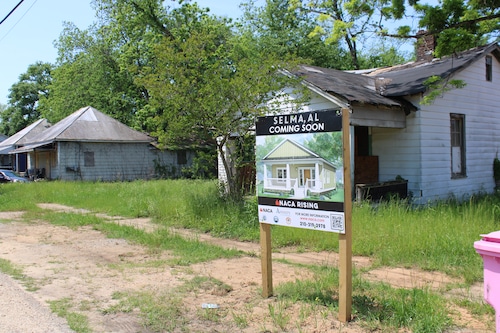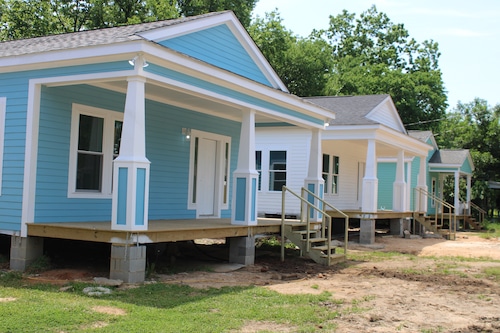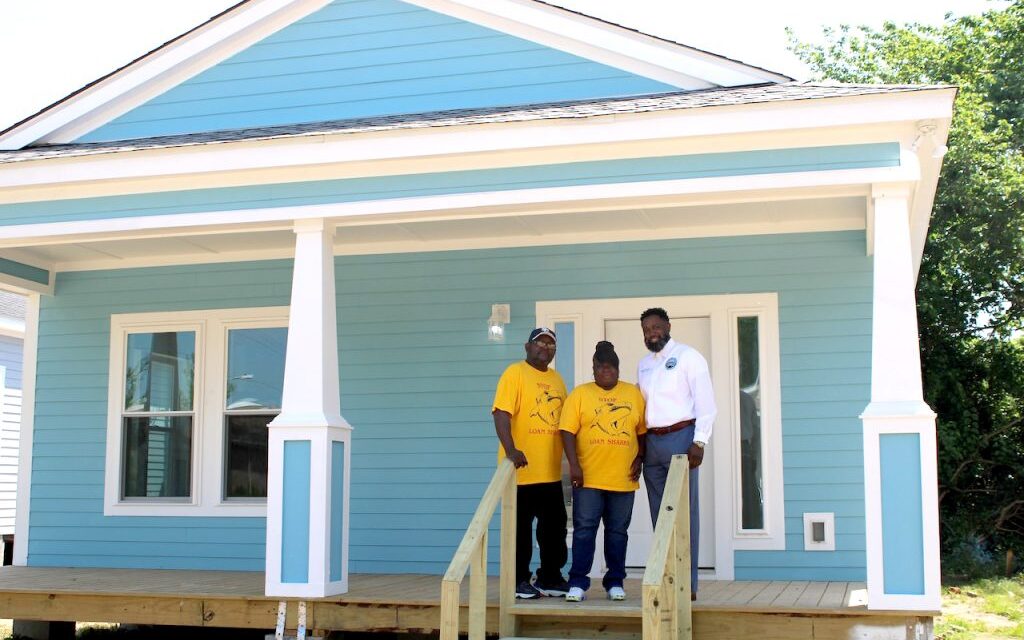When a tornado hit Selma last January, Tamicka Newberry and her husband didn’t just lose their home, she said. They also lost the strong sense of community they shared with their neighbors.
“To relocate, it wasn’t just like we lost our apartment,” Newberry told AL.com. “We lost our family too. I still keep in contact with some of them, but some went here and some went there, so you know, it’s been a journey.”
In a city already short on housing and losing population each year, an estimated 1,800 families were displaced by the tornado, according to city officials, many of them left to live in hotels while they searched for permanent accommodations. About 535 of those families received rental assistance from FEMA to be rehoused, but “we can reasonably assume that was assistance to go live elsewhere,” said Danielle Wooten, the planning and development director for the city of Selma.
But Newberry dreamed of owning a house she could pass down to her family — one with a front porch and a yard where her grandchildren could play. Last month, her dream came true. She won a free home in a raffle from a new initiative to revitalize her hometown.
“It was awesome,” Newberry said. “It took me a minute to realize it was my name and then I jumped for joy.”
The new, innovative effort to build more affordable homes in Selma, the iconic civil rights city of just under 17,000 west of Montgomery, has the potential to not only be a foundation for economic and social growth, but also a model for the nation struggling with an affordable housing crisis, said Wooten.
“This project definitely is serving as a model. A model for communities of all sizes, honestly, but definitely as a model for rural, disadvantaged small communities,” Wooten said.
Wooten said the city is not keeping data on whether families are returning to Selma after being displaced. But according to recent census data, Selma lost another 341 residents from July 1, 2022 to July 1, 2023, a decline of 2% in a single year.
A major obstacle to returning, and a factor in the population decline, has been a housing shortage that plagued the city long before the tornado.
“It creates a situation where people cannot live and work in Selma…and the tornado has just exacerbated that crisis,” Wooten said.
‘Growth and revitalization’
Newberry struggled to feel at home last year after the tornado tore the roof off their rental apartment and flooded the interior, forcing her and her husband to live with relatives across town.
With winds over 100 mph, more than 600 structures and roughly half of the residential neighborhoods in Selma were destroyed, Mayor James Perkins told AL.com last year.

“It was just a different atmosphere,” Newberry said. “There was a roof over our head but it didn’t feel like home. It didn’t feel like a fit for me.”
Newberry began attending meetings of the Neighborhood Assistance Corporation of America, a national nonprofit that helps people access affordable housing, to learn about the steps to becoming a homeowner.
The housing organization first approached officials in Selma a few months before the tornado about holding workshops to help more people become homeowners. They were scheduled to hold their first workshop on the day the storm hit.
Now, amid the continuing recovery efforts and for the first time ever, NACA is playing the role of developer — building 100 new affordable homes in the city, houses that are energy-efficient and climate resistant to help Selma be more resilient in the face of future natural disasters.
The modular homes were built according to international housing code, tested to withstand high-wind speeds that mimic hurricanes and tornadoes.
NACA also will provide financial counseling to help people sustain homeownership.
Brian Rodriguez, a mortgage counselor for NACA, said he hopes housing is the starting point for growth in the city.
“When people feel that they have a safe place, a comfortable place where they can lay their head, commune with their families, it’s uphill from there…you can then look at other avenues like employment and social and economic stability,” he said.
“Look what happened after the storm. The rental market couldn’t support the amount of people that needed a place to go…but if you have stability in homeownership and insurance, I don’t think we would have seen such an exodus in Selma.”
In a public-private partnership with the city, Selma Housing Authority and the Black Belt Community Foundation, NACA has built the first five homes, which are now available for sale. The housing authority purchased the land while NACA purchased the houses with $700,000 in funding coming from the community foundation, according to leaders of the initiative.
Bank of America has had a long relationship with NACA and is subsidizing the project with an additional $2 million, Rodriguez told AL.com.
The homes are three bedroom, two bathroom and sell for around $169,500.
For the first time, the Selma Housing Authority will also allow people to use Section 8 vouchers toward home ownership. The subsidies from the housing authority vouchers can go toward paying a mortgage every month instead of rent.
“Our goal is to see how we can use our vouchers to create homeownership opportunities,” said Kennard Randolph, CEO of the Selma Housing Authority.
According to Randolph, the housing authority has also bought homes in the community to rehabilitate.
“We want to create those opportunities, not only for our residents, but for school teachers, for firefighters, for people that work at the hospital, anybody who wants to live and work in Selma,” he said. “This could significantly help with our city’s growth and revitalization.”

‘I can see Selma coming back’
During one of the NACA workshops, Newberry put her name in a lottery to win one of the newly built houses.
On April 18, a crowd gathered outside a new home in a neighborhood near downtown Selma, on one of the streets hit hardest by the tornado. Newberry “jumped for joy” and nearly collapsed when her name was announced as the winner of the brand new house.
Randolph also informed Newberry that the partnership would furnish the house and pay for insurance the first year.
“That will give me and my husband time to save money and everything,” she said. “It’s a blessing and we are very grateful to everyone involved.”
According to Wooten, this collaboration could be a model for how the nation tackles the affordable housing crisis.
“NACA knows that if they can do it here in Selma in these conditions, they should be able to replicate it in other areas as well,” Wooten said.
Selma has been the fastest-shrinking city in Alabama for the past several years. The population decline, hastened by white flight and the Craig Air Force Base closure in 1977, has caused many businesses and community centers, such as the Brown YMCA, to permanently shutter.
Since Selma won the nation the right to vote in the 1960s, the population has gone down by 37% and by 13% in the last decade alone.
“I do think there’s a correlation with the housing shortage and population decline, especially with quality housing access,” said Wooten, noting that it’s been 20 years since the city’s last subdivision was built.
Many of the affordable multi-family and single-family homes in Selma were designated for low-income residents or senior living, leaving middle class families and individuals few options. Some buildings were left abandoned as residents moved away or died.
The Selma and Dallas County Economic Development Authority recently reported that the area has thousands of jobs available, namely in the manufacturing and distribution industries. This year, Selma ranked in the top 50 of ‘micropolitan’ areas nationwide — cities with populations between 10,000 and 50,000 — for corporate expansion.
But about 5,000 people drive into the county every day for work, largely because of the housing shortage.
“Housing absolutely impacts the economic status of the community as well as quality of life,” Wooten said.
At her new home, Newberry immediately began to envision where she would put the dining room table so she and her family can have meals together again. She can see the backyard from the kitchen where she can watch her grandkids play, just a few blocks from her stepdaughter’s home.
Newberry recently got a new job at Reflections, a new coffee shop on Water Street that she can walk to. U.S. Rep. Terri Sewell and the Small Business Administration recently recognized the shop’s owner among business leaders who contribute to rebuilding their communities after natural disasters.
Selma still isn’t the same since the tornado, Newberry said, but “it’s getting back, I can see Selma coming back.”
She still wants to see more businesses and more houses, people coming back together “like a family should be.”
For Wooten, homeownership is the cornerstone for all of those objectives.
“Research has proven that individuals who own their homes are more prone to have pride and to take care of their homes and, you know, their neighborhoods and their communities,” she said. “Home ownership has to be a foundation for long-term stability. By owning your homes, families create a legacy for the future generations and secure family success.”
Newberry is eager to create that legacy for her family. Her daughter recently got married and she hopes she will soon come home when she finishes her military duties.
“This is a dream come true and now it’s a dream I can pass down to my kids and my grandchildren,” she said.











